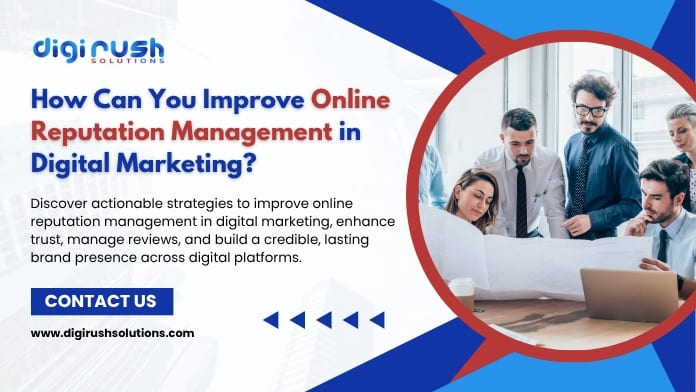
Online reputation has become the foundation of business success in the digital era. Your online perception directly influences your growth, customer confidence, and market positioning. Successful online reputation management in online marketing ensures that your audience perceives your business in the most favorable light, whether they are reading customer reviews, social media posts, or industry-related forums.
Each online interaction influences your reputation. From customer reviews to search results, every bit of online content counts. The question is: How can you strategically build and enhance your online reputation? Let's explore best practices that can improve your online presence and foster long-term trust.
Understanding Online Reputation Management
Online reputation management (ORM) refers to the process of tracking, shaping, and managing how your brand is perceived online. It entails responding to negative reviews, eliciting positive reviews, interacting with your fans, and ensuring that accurate information about your brand is readily available.
For companies, ORM is not merely damage control—it's proactive reputation management. Customers are increasingly relying on what they read online for their buying decisions, so your brand's trustworthiness can make or break those conversions.
Most brands partner with best web service providers to develop a robust ORM strategy that incorporates search optimization, content marketing, and digital engagement.
Why Online Reputation Management Matters in Digital Marketing
ORM and digital marketing complement each other. Your search visibility with SEO, social media advertising, and paid ads can get traffic, but if your reputation is not good, that traffic may not convert. Research indicates that the majority of customers place as much trust in online reviews as they do in personal recommendations. One bad article, review, or comment will have a ripple effect throughout your online presence.
By paying attention to online reputation management in your digital marketing, you can form an integrated strategy that not only draws customers towards you but also reassures them about the quality and trustworthiness of your products. Good reviews, excellent search rankings, and interactive online conversations all contribute toward forming a credible digital identity.
Key Strategies to Improve Online Reputation Management
1. Keep Tabs on Your Online Reputation regularly
You can't control what you don't monitor. Continue to monitor what others are saying about your brand on search engines, social media sites, and review websites. You can use online tools such as Google Alerts, Brand24, or Mention to get real-time alerts whenever your brand name is mentioned.
This strategy enables you to catch potential problems early and rectify them before they grow out of control. Knowing the conversations about your brand allows you to steer the narrative in a positive direction.
2. Foster Positive Customer Reviews
Reviews are strong trust indicators. When prospects read genuine, positive reviews, they are more inclined to trust your brand. Eagerly ask happy customers for their feedback and simplify the review process.
Even when negative criticism arises, respond professionally. A well-addressed complaint can transform a dissatisfied customer into a loyal champion, demonstrating your brand's commitment to customer satisfaction.
3. Have an Active and Engaging Social Media Presence
Your social media sites are the most prominent part of your online reputation. Ongoing interaction with your audience reinforces trust and keeps your business at the forefront of their mind. Share excellent content, leave comments on comments, and genuinely engage with followers.
Many brands hire a professional social media management company to ensure that engagement, content scheduling, and community building are handled efficiently and effectively. Address negative comments respectfully, and consider moving the conversation to private channels if necessary. Active social media engagement humanizes your brand, making it more approachable and trustworthy.
4. Optimize for SEO and Content Visibility
Your digital reputation depends significantly on what appears in search results when someone searches for your brand. Having an effective SEO strategy in place ensures that top-priority, brand-vetted content appears above any hostile or irrelevant content.
Companies often seek SEO Services in Jaipur or other trusted markets to improve their brand's rankings in search engines. Develop valid blog entries, press releases, and similar pieces of content that demonstrate your authority. Over time, properly optimized content has the potential to suppress any negative listings and establish a more positive online image.
5. Act Quickly to Provide Feedback
Customer feedback can ruin your reputation if ignored. Both positive and negative feedback must be addressed promptly to demonstrate that your brand genuinely cares about its audience. There is nothing like building trust with users by acting quickly and showing that you respect their experiences.
A well-defined response mechanism is necessary, particularly concerning complaints or issues raised in public forums. Maintain a polite and considerate tone at all times, offering solutions rather than excuses.
6. Establish Trust Through Transparency
Consumers appreciate transparency. Being honest about your services, pricing, and policies goes a long way in building long-term credibility. If your brand makes a mistake, admit it, and outline the steps you're taking to correct the issue.
Transparency fosters loyalty and helps prevent negative situations from spiraling into larger reputational crises.
7. Create High-Quality and Shareable Content
Publishing informative, relevant, and engaging content establishes your brand as an authority in your niche. Quality content not only drives organic traffic but also influences the online discussion of your brand.
Brands utilize content creation services to consistently produce blog posts, case studies, infographics, and videos that showcase their expertise. When individuals find your content of worth, they'll share it, growing your audience and establishing your reputation.
8. Work with Trustworthy Influencers and Partners
Collaborating with reliable influencers and business experts can enhance your brand's credibility. If reputable personalities vouch for your brand, their audience tends to believe you. Ensure that any collaboration aligns with your brand's values to maintain authenticity and integrity.
Certain businesses integrate influencer tactics with best SEO services in India to further enhance the exposure of these endorsements on search engine results pages.
9. Have a Crisis Management Plan
Despite proactive efforts, reputational crises can still occur. Having a plan ensures you can respond promptly and effectively. Establish the steps for internal communication, customer communication, and public statements during crises.
A quick, well-coordinated response can contain damage and demonstrate your willingness to solve problems.
10. Conduct Regular Online Reputation Audits
Conducting regular audits of your online presence enables you to identify gaps and opportunities for improvement. Review your website, social media handles, review sites, and search engine listings to verify that what people find out about your brand is accurate and favorable.
Regular audits enable you to identify potential problems and continually refine your ORM strategy.
Integrating ORM with Broader Digital Marketing Efforts
Digital marketing and online reputation management are not isolated efforts. It must be integrated into all facets of your marketing campaign. For instance:
- All SEO campaigns must focus on good content that is well-ranked.
- Social media campaigns should prioritize responsiveness and engagement to maximize their effectiveness.
- Buying advertising can highlight positive reviews and success stories from customers.
By integrating ORM with your online marketing objectives, you establish a cohesive strategy that enhances brand credibility and trust.
Long-Term Benefits of Strong Online Reputation Management
Investing in ORM has various long-term advantages:
- More customer trust: A good reputation inspires trust among prospective customers.
- Better conversion rates: Individuals tend to opt for a brand with a proven track record.
- Deeper customer loyalty: Ongoing interactions and openness encourage customers to return.
- Enhanced competitive edge: A good reputation sets your brand apart in a competitive marketplace.
These advantages lead to sustainable growth, making your company a trustworthy and customer-centric brand.
Final Thoughts
Enhancing online reputation management through digital marketing requires persistence, honesty, and forward-thinking. By tracking your online presence, interacting with customers, and creating valuable content, you can establish a strong digital reputation that supports your overall marketing strategy.
Establishing trust requires effort, but by implementing the right strategies, you can create a positive and lasting impression that attracts customers and fosters their loyalty to your business.
Recent Blog











